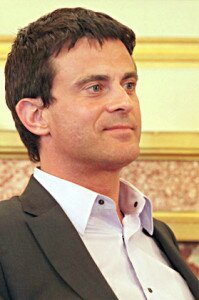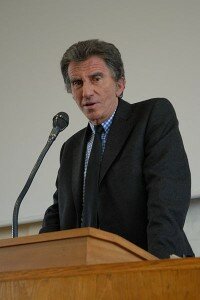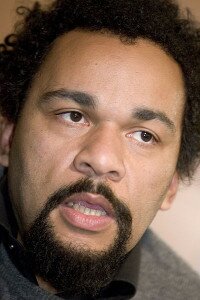Correspondent (Europe)
PARIS – The one man show of controversial French humorist Dieudonné M’Bala M’Bala (known as Dieudonné) was banned last Thursday from the stage by the Council of State, France’s supreme court for administrative justice. The show, Le Mur (The Wall), was prohibited after many anti-racist associations and the Jewish community asked the authorities to outlaw it, especially due to the anti-Semitic content of Dieudonné’s past shows.
Indeed, the comedian is known for his slurs against the Jewish community and the ‘system’, which includes the government, the media and the financial world. His frequent insulting jokes on the Holocaust and allusions of a phantom ‘Zionist-American axis of power’ has attracted the support of many in France, regardless of their social or ethnic origins. In fact, the comic’s fan base is quite heterogeneous. It goes from the youth of the banlieues, who are mostly of North-African or African origin, to the voters of the xenophobic Front National political party, and some VIPs such as, French footballer Nicolas Anelka who, during a match last month, made a quenelle – a gesture considered by many as an inverted Nazi salute, created by Dieudonné himself.
 A few weeks before the premiere of Le Mur, scheduled on January 9, 2013 at the Zénith theatre in Nantes, survivors of the Holocaust and associations against racism asked the local authorities and the government to ban Dieudonné’s show on a national level, accusing him of inciting racial hatred. This brought Manuel Valls, the Interior Minister, to send a circular to all the Prefects of the country, asking them to evaluate whether Mr. M’Bala M’Bala’s show could cause a threat to the public order. Thus, given the risks of riots before and after the show in Nantes, the prefect of the Loire-Atlantique department decided to prohibit the show.
A few weeks before the premiere of Le Mur, scheduled on January 9, 2013 at the Zénith theatre in Nantes, survivors of the Holocaust and associations against racism asked the local authorities and the government to ban Dieudonné’s show on a national level, accusing him of inciting racial hatred. This brought Manuel Valls, the Interior Minister, to send a circular to all the Prefects of the country, asking them to evaluate whether Mr. M’Bala M’Bala’s show could cause a threat to the public order. Thus, given the risks of riots before and after the show in Nantes, the prefect of the Loire-Atlantique department decided to prohibit the show.
However, the humorist appealed against the ban at the administrative court of Nantes which, on Thursday – the day of the one man show, overturned that ban. Hence, the Interior Minister, with the support of the government, appealed against the Nantes ruling at the Council of State on the same day, reinstating the ban two hours before the scheduled beginning of the play. 2,500 ticket-holders were already in front of the theatre, and seeing riot police blocking the access to the building caused some confusion amongst the potential audience. When they received the news of the Council of State’s decision, Dieudonné’s fans started hissing and shouting at the police. However, the comedian asked them to avoid demonstrating because, “they [the system] are looking for physical confrontation”. Dieudonné thus told his fans to go back home singing La Marseillaise, the French national anthem.
The Council of State’s ruling has opened a debate on freedom of speech and the state’s role in cases such as Dieudonné’s show. Both the government and President Hollande agree with the council’s decision. Mr. Valls said that the decision to keep Dieudonné off the stage strengthens France, adding that, ‘In the face of the mechanics of hate…we need firmness and determination and great calm’. Mr. Hollande described the ruling as a ‘victory’.
 However, some fear that the court’s ruling could prove counter productive. The League for Human Rights said that the ban could rally the support of those who feel marginalised along with Dieudonné. Moreover, the intellectual and former Minister of Culture Jack Lang declared that despite “the satisfaction of seeing Dieudonné and his insults defeated by the authorities”, there has also been a partial attack on the constitutional state. In fact, Mr. Lang explained that, “Given that the judicial authorities could not stop the comic, a power of moral and penal repression has been given to the administrative police, which it doesn’t have [according to the French Constitution]“. He added that since there was no real risk to public order, the council should have confirmed the court of Nantes’ decision to lift the ban.
However, some fear that the court’s ruling could prove counter productive. The League for Human Rights said that the ban could rally the support of those who feel marginalised along with Dieudonné. Moreover, the intellectual and former Minister of Culture Jack Lang declared that despite “the satisfaction of seeing Dieudonné and his insults defeated by the authorities”, there has also been a partial attack on the constitutional state. In fact, Mr. Lang explained that, “Given that the judicial authorities could not stop the comic, a power of moral and penal repression has been given to the administrative police, which it doesn’t have [according to the French Constitution]“. He added that since there was no real risk to public order, the council should have confirmed the court of Nantes’ decision to lift the ban.
As a result of the show being banned in Nantes, Tours, and Orléans, Dieudonné decided to stage the censored version of Le Mur, Asu Zoa (which he claims to have written in three nights) last Monday in Paris. The show was sold out and spectators, at the end of the show, said that no anti-Semitic slurs were made, and that the comic is trying to speak for those whose opinion is never asked for.
Image Courtesy: Wikimedia Commons (Réseau Voltaire, fondapol, Guillaume Paumier)
Stefano Duc
Latest posts by Stefano Duc (see all)
- Clashes in Kiev After Thousands Rally Against Restrictive Laws on Protests - January 19, 2014
- Dieudonné and His Anti-Semitic Show: The Council of State Says ‘Non’ - January 19, 2014
- Russia Once Again Under Attack While Putin Reassures on Sochi Games’ Safety - January 17, 2014





No comments
Be the first one to leave a comment.